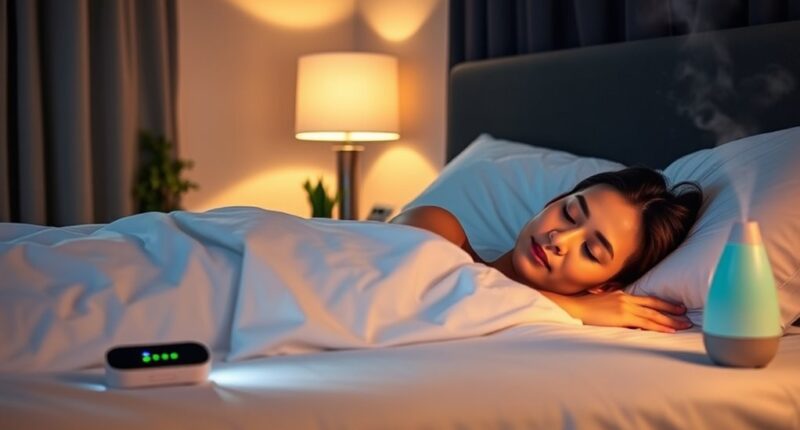To biohack your sleep with simple, science-backed tweaks, start by maintaining a consistent wake-up time and create a relaxing bedtime routine that signals your brain it’s time to wind down. Manage light exposure by dimming lights an hour before bed and using blue light filters on screens to boost melatonin production. Avoid heavy meals, caffeine, and alcohol close to bedtime. Incorporate mindfulness or gentle exercise, and you’ll discover even more ways to optimize your sleep health.
Key Takeaways
- Maintain a consistent sleep schedule, including weekends, to reinforce your body’s natural circadian rhythm.
- Reduce blue light exposure from screens an hour before bed using filters or glasses to boost melatonin production.
- Create a sleep-friendly environment: cool, dark, quiet room with blackout curtains or eye masks.
- Avoid heavy meals, caffeine, and alcohol close to bedtime to prevent sleep disruptions.
- Incorporate relaxation techniques like mindfulness or light exercise earlier in the day to promote better sleep quality.

Have you ever wondered if you could optimize your sleep beyond traditional methods? It’s a common curiosity, especially as more people discover how powerful small tweaks can be. One of the most effective ways to do this involves understanding your body’s natural clock: your circadian rhythms. These internal processes regulate your sleep-wake cycle, influencing when you feel alert and when you feel sleepy. By aligning your daily habits with these rhythms, you can improve both the quality and duration of your sleep. Simple adjustments, like consistent wake-up times, can reinforce your circadian rhythms, making falling asleep and waking up easier.
Align your habits with your circadian rhythms for better sleep quality and easier waking.
Another key aspect of biohacking sleep is focusing on sleep hygiene. This isn’t just about avoiding caffeine or screens before bed; it’s about creating an environment and routine that signals to your brain that it’s time to wind down. You can start by establishing a regular sleep schedule—going to bed and waking up at the same times every day—even on weekends. This consistency helps regulate your circadian rhythms, making your sleep more restorative. Additionally, your sleep environment matters. Keep your bedroom cool, dark, and quiet. Blackout curtains or eye masks can block out light that might interfere with melatonin production, the hormone responsible for sleepiness.
Limiting exposure to artificial light in the evening is another vital step. Light from screens, especially blue light emitted by smartphones and computers, suppresses melatonin. To hack your sleep, try dimming lights an hour before bed and consider using blue light filters or glasses. This signals to your brain that it’s time to wind down, aligning your sleep cycle with natural cues. Also, avoid heavy meals, caffeine, and alcohol close to bedtime, as they can disrupt sleep cycles or make it harder to fall asleep naturally. Incorporating practical mindfulness techniques can further support your efforts by reducing stress and promoting relaxation, which are essential for a good night’s sleep. Regular physical activity also supports better sleep, but try to finish workouts at least a few hours before bed to prevent overstimulation.
Frequently Asked Questions
Can Biohacking Sleep Improve Overall Mental Health?
Improving your sleep can markedly boost your mental clarity and emotional resilience. When you prioritize quality rest through simple biohacks, you give your brain the chance to recover and process emotions better. This leads to clearer thinking and a stronger ability to handle stress. By making small adjustments like optimizing your sleep environment and maintaining regular sleep schedules, you actively support your mental health and overall well-being.
Are There Any Risks Associated With Sleep Biohacking?
You might wonder if sleep biohacking has risks, especially around sleep deprivation or supplement safety. While some techniques and supplements can boost your sleep, they may also cause side effects or interfere with natural rhythms if overused. It’s essential to research thoroughly and consult a healthcare professional. Rushing into biohacking without proper knowledge could lead to sleep disruptions, making you feel worse instead of better.
How Long Does It Take to See Results From Sleep Tweaks?
Think of your sleep cycle as a garden that needs time to flourish. You might start noticing improvements in your sleep quality within a week, especially if you focus on tweaking your REM duration and sleep hygiene. However, for more significant changes, like increased energy or better focus, it could take two to four weeks. Consistency is key—stick with your routine, and results will bloom over time.
Is Sleep Biohacking Suitable for Everyone?
Sleep biohacking may not be suitable for everyone due to personalization challenges and accessibility concerns. You might find some tweaks beneficial, but individual differences mean results vary. If you have underlying health issues or limited resources, certain strategies could be less effective or harder to implement. It’s essential to evaluate your unique needs and consult a professional if needed, ensuring safe and effective sleep improvements tailored to you.
What Are the Best Wearable Devices to Track Sleep?
Ever wonder how to unlock better sleep? Wearable technology makes sleep tracking a breeze, giving you insights into your rest patterns. Top devices include the Fitbit Sense, Apple Watch Series, and WHOOP Strap, all offering detailed sleep data. These wearables help you identify trends, improve sleep quality, and optimize your nightly routine. With accurate sleep tracking, you turn data into action, empowering your journey to restorative sleep.
Conclusion
By making small, science-backed tweaks to your sleep routine, you’re fundamentally tuning a finely crafted instrument—each adjustment brings harmony and better rest. Imagine your sleep as a garden; watering it with consistent habits and sunlight from proper lighting can turn chaos into calm. Remember, even a tiny change, like reducing screen time before bed, can lead to profound improvements. Start small, stay consistent, and watch your sleep flourish like a well-tended garden.










